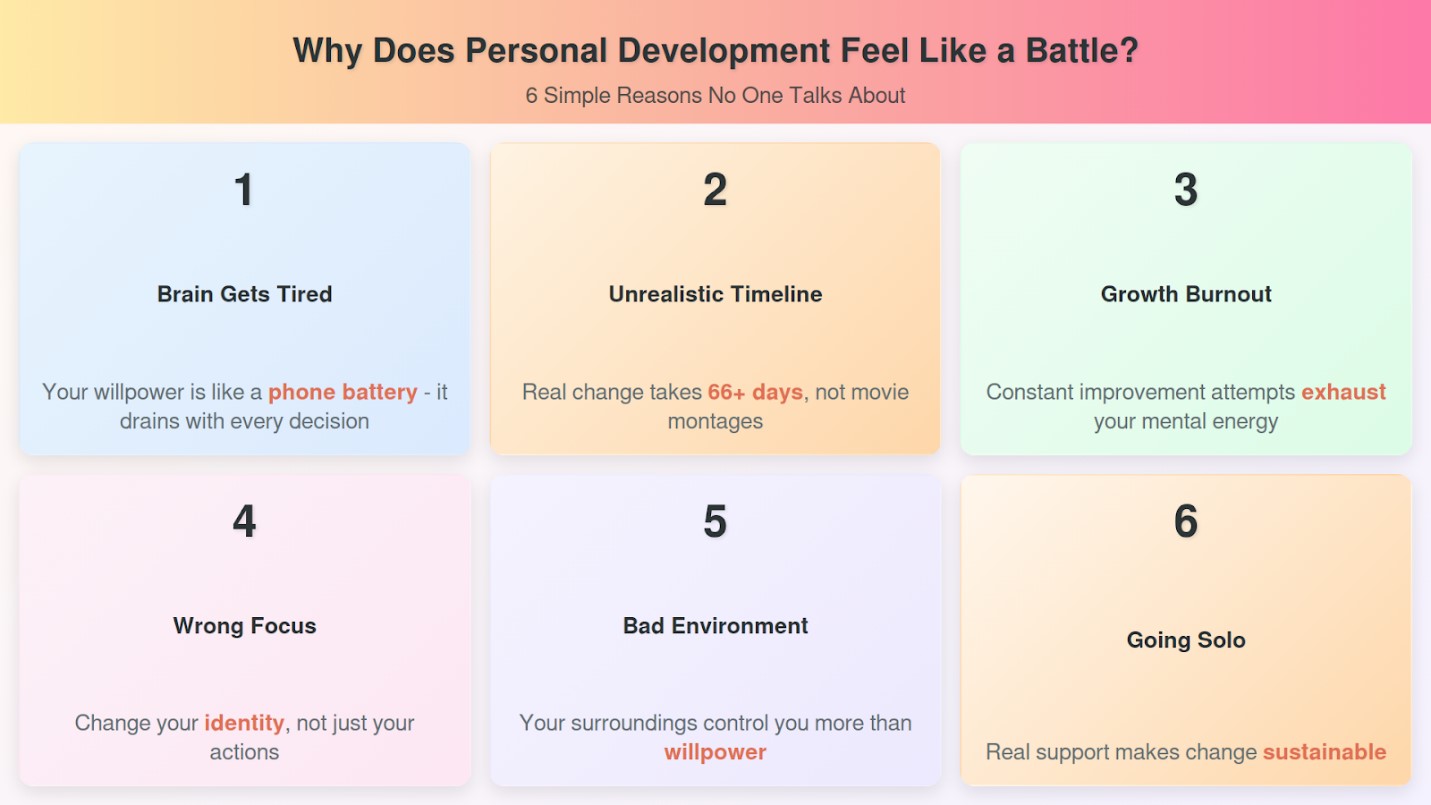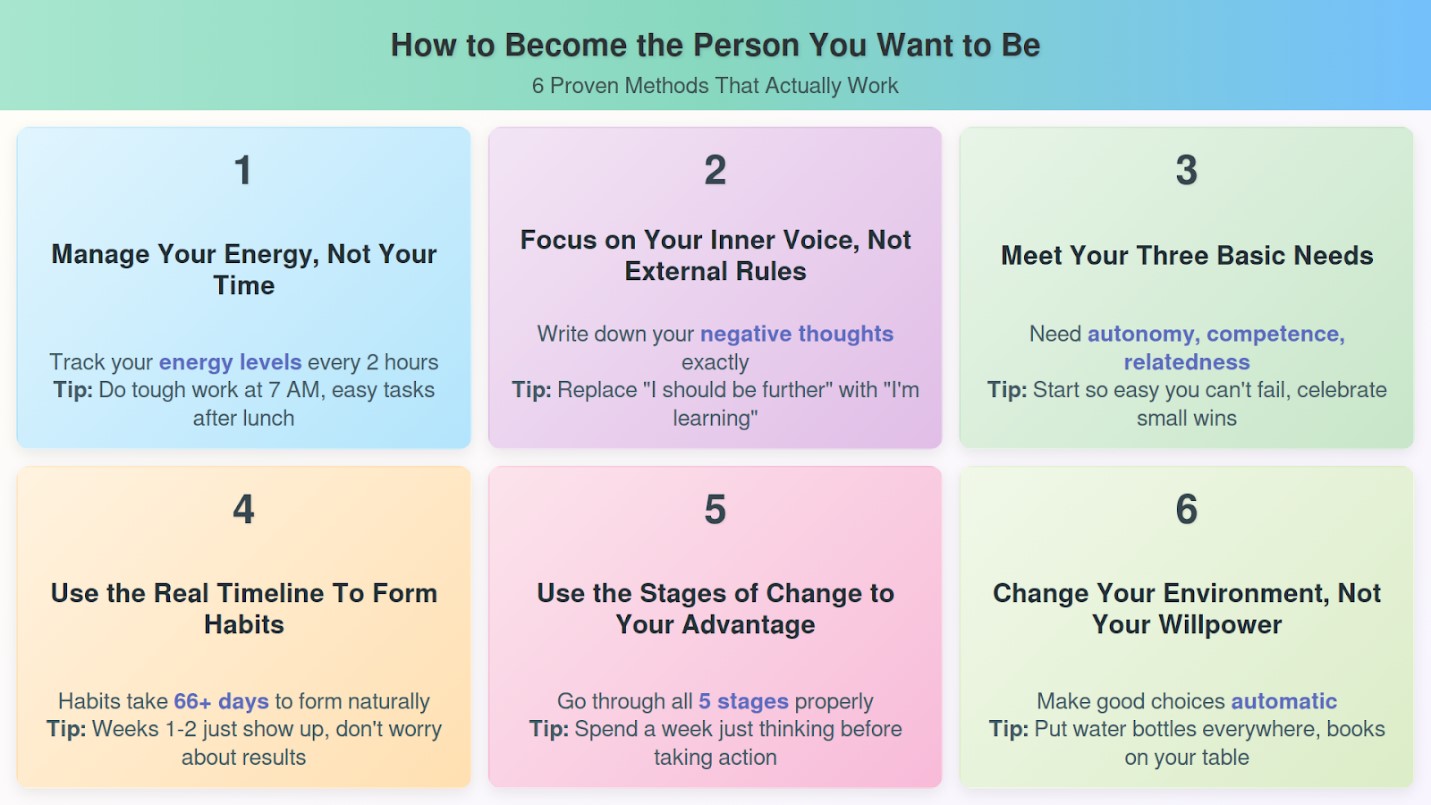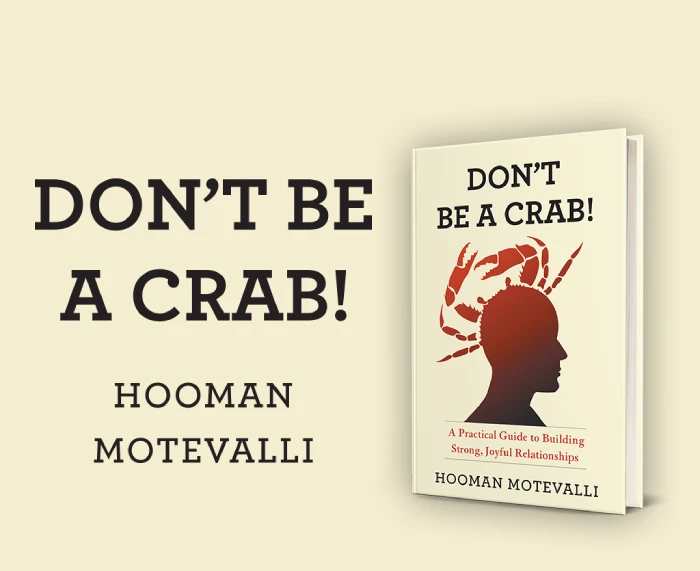Most likely, you’ve been there before. New year, new you, right?
You get all excited, make these great plans to change your life, and then, two weeks later, you’re tired and back to binge-watching Netflix in your jammies.
Nobody tells you this, but the problem isn’t that you’re weak, lazy, or lack drive. It’s that voice in your head that keeps saying, “See? You can’t stick to anything.”
Unfortunately, almost everything you’ve learned about personal growth is wrong, and it’s meant to discourage you before you even begin.
What if I told you there was a way to change into the person you want to be that didn’t feel forced?
Why Does Personal Development Feel Like a Battle?
This feeling keeps happening to you for these 6 simple reasons, but no one talks about them.

Reason 1: Your Brain Gets Tired, Too, Just Like Your Body
Now, picture this. You choose to get up early, go to the gym, eat very well, and read every night. The first day is great. The third day is harder. On day seven, you’re so tired that you can hardly get out of bed.
This is because your brain is like a cell phone battery. Every time you make a choice or stop yourself from doing something you want to do, you lose a little amount of willpower. Also, if you try to change everything at once, your phone will shut down because it has too many apps open at once.
You’re overwhelmed, stuck in your thoughts, and the quiet voice in your head criticizing your every move seems to have taken over—a common pattern when your mental clarity in relationships starts to erode. Learning how to navigate from confusion to clarity can shift how you relate to both yourself and others.
What actually happens:
- 77% of people give up within the first week (Norcross & Vangarelli, 1988)
- Your willpower gets weaker as the day goes on
- When it’s gone, your brain just goes back to what it knows
Reason 2: You Want Results Too Quickly
A lot of people believe that things should change like in movies. Dramatic music, a montage scene, and all of a sudden, that person is completely different after 30 days. That’s not how things work at all in real life.
This is what really happens. You’re trying to learn Spanish, get in shape, and start that side business at the same time. After a month of things going slowly, you start to worry that you’re making mistakes. However, you are actually doing the right thing.
The truth about timing:
- It only takes 66 days to form a new habit
- Some habits take way longer, like 8 months
- Your brain needs time to change the way it works.
- Most of the time, quick effects don’t last anyway.
Reason 3: Trying To Get Better Can Make You Tired
Simply trying to get better can wear you out. It’s real and is known as growth burnout.
Every little failure makes you think you’re not good enough for this, and stuff that clearly isn’t working keeps getting harder for you.
Signs that you’re tired of trying to improve yourself:
- Feeling tired after achieving goals
- Getting mad at small mistakes
- Comparing yourself to other people all the time
- Not sure why you’re not much further along
It’s like making yourself wake up at 5 AM when you normally stay up late. After months of this, you’re still tired and not as effective as you were before. That’s your mind telling you to calm down.
Reason 4: You’re Thinking About the Wrong Things
Most people focus on fixing what they can see instead of what’s important.
They heavily limit their food intake in order to lose weight. Or they try to think happy things because they want to be happier, and practice talking to people because they want to have stronger relationships.
But here is something that works much better. Change how you see yourself instead of what you do.
Thinking “I’m the kind of person who takes care of their health” is better than saying “I want to lose weight.”
Let’s say you try all the diets in the world for years and still gain the weight back. Then you start to think of yourself as “healthy,” and all of a sudden, you choose well without even thinking about it.
And in the end, losing weight is easy and stays off.
Reason 5: Your Setup is Working Against You
Willpower alone won’t get you out of a bad situation. No matter how much you try, eating clean will be a hard task as long as junk food is in your kitchen.
What you do is controlled by your environment much more than by your passion. Discipline isn’t necessary for smart people; they just make the good things easier and the bad ones harder.
There are times when you want to read more but end up watching Netflix instead. But what if you put books next to your bed and the controls in a drawer across the room?
Now reading is the easier option, and the habit sticks.
Reason 6: You’re Doing This All on Your Own
It’s hard to change by yourself, just as it’s hard to move a sofa alone. You could do it, but it would be really hard, and you would probably hurt yourself while doing it.
Holt-Lunstad say those who have real help are much more likely to stick with changes. The important thing is that it’s not about having people cheer you on.
It’s about having people who really know what you’re going through and can help when things become tough.
Maybe anytime you try to stop smoking by yourself, you fail. On the sixth time, you get help from a support group and regularly check in with someone.
What happens? So two years later, you still don’t smoke because you had someone to turn to when things got tough.
How to Become the Person You Want to Be
The old way doesn’t work anymore, now you know why. Still, what does work? How can you change your life without getting so tired that you want to pass out?
We will show you step-by-step how to use each of these 7 valid ways. These ideas have been tested and proven to help tens of thousands of people change their lives without getting burned out.

Method 1: Manage Your Energy, Not Your Time
Ignore the idea of getting more into your day. That’s not how change works correctly. Instead, pay attention to when you’re busy and when you have time to relax (Schwartz & McCarthy, 2007).
Problem-Solving Methods
- Write down how you feel every 2 hours for a week to keep track of your energy.
- Use an easy-to-understand range from 1 to 10 (1 = totally tired, 10 = super energetic).
- Most people have the most energy in the morning, so plan hard tasks for this time.
- Do easy things after lunch when your energy drops.
- A small energy boost in the late afternoon is good for creative work.
- It’s up to you in the evening; some people get a second wind.
- Plan big changes only when you’re feeling highly energized.
For example, instead of pushing yourself to work out at 6 PM when you’re tired, do it at 7 AM when you’re awake and prepared to go.
Always work with your body instead of against it, and your success rate will go through the roof.
Method 2: Focus on Your Inner Voice, Not External Rules
People usually try to change by following someone else’s plan. But as Hooman Motevali mentioned in his “Don’t Be A Crab Book,” everything you do is controlled by what you say to yourself, and until you learn to control it, you’ll keep hurting yourself.
Solutions That Work
- If you’re angry or want to quit, write exactly what you’re thinking.
- Don’t judge the thoughts; just write them down word for word.
- Avoid patterns that come up a lot, such as “I should be farther along” or “I’m not good at this.”
- Ask yourself, “Does this thought help me right now?”
- Replace negative thoughts with positive ones, like “I’m learning” or “It takes time to make progress.”
Inner Voice Sabotage Patterns
- “I should be further along by now.”
- “Everyone else makes this look so easy.”
- “I’m not the type of person who can do this.”
- “I’ve tried this before and failed, so why try?”
Method 3: Meet Your Three Basic Needs
Researchers have found that people have three basic psychological wants that must be met for change to last. In the absence of these needs, you will feel worn out and desire to give up. But once they are met, it’s easy to make changes.
Problem-Solving Methods
For Autonomy (feeling like you choose this):
- Believe in whether you want to do this or whether you believe you should.
- Connect the word “should” to what you really want if it’s there.
- Make a list of your own reasons for this change.
- Check that your goals are not the same as someone else’s.
For Competence (feeling like you’re getting better):
- Start with something so easy that you can’t fail.
- Every day, celebrate small victories.
- Save your work in a way that shows growth.
- Slowly make things harder after you’ve gotten good at them.
For Relatedness (feeling connected to supportive people):
- Find at least one person who backs your decision to change.
- Join online groups of people who want the same things you do.
- Be clear about how people can help you.
Before you make a change, ask yourself, “How can I feel like I chose this?” What should I do to make this work for me? Who can be there for me during this?”
Method 4: Use the Real Timeline To Form Habits
Do you remember how we said it takes 66 days to form a habit? Okay, that’s just the norm. And that’s totally fine—some habits take a lot longer.
Timeline Solutions That Really Work:
- Weeks 1 and 2: Just show up; don’t worry about results at all.
- Weeks 3–8: It will feel hard and strange; this is normal.
- Weeks 9–12: It begins to seem more natural, but it still takes work.
- Months 4–6: Most people automatically do it.
- Whatever you miss doesn’t matter; just do it again tomorrow.
- Be kind to yourself; changing some habits can take up to eight months.
Method 5: Use the Stages of Change to Your Advantage
As Prochaska and DiClemente say, most people try to skip ahead through change instead of going through each step properly.
According to Prochaska and DiClemente, change has five steps that you can’t skip. This is exactly how it works when you’re trying to get fit.
Stage 1: You Don’t Even Think About It
You’re just going about your day, maybe moaning about how tired you are or how tight your clothes are, but working out isn’t really on your mind yet.
What do you need to do? Do nothing! Watch yourself when you say you’re not in shape.
Step 2: You Start To Think About It
Now you’re probably thinking, “I really should do something about this,” as you check fitness-related social media posts or even YouTube videos.
What you actually do:
- Subscribe to some exercise apps.
- Pay attention to how you feel after going up and down stairs.
- Just think about what kind of exercise you might enjoy.
- Now is not the time to buy anything.
Step 3: Get Ready To Start
Now that you’re sure you want to change, you’re making plans to do so. Many people rush and make mistakes here.
Your list for getting ready:
- Decide on ONE type of exercise you might not hate.
- Figure out where you can do it, like in the gym, at home, or at the park.
- Pack your shoes, clothes, and other things you’ll need.
- Fix a timetable (don’t be too bold; be reasonable).
- Share your plans with someone.
Stage 4: Actually Doing It
Now you start working out. But for the first few months, this stage should feel weird and hard. How does success look at this point?
- There are times when you don’t want to, and still you show up.
- No matter how bad it is, you do something.
- You change when things aren’t going well.
- At first, you think it will feel weird.
Stage 5: Making It Stick to Your Mind
After a few months of regular exercise, it starts to feel normal. You no longer need to persuade yourself to do it.
How do you know you’re here?
- You feel strange when you don’t work out.
- Now it’s just something you do every day.
- Sometimes you even look forward to it.
- Let failures happen without giving up.
Why People Stop Trying?
They try to skip stage 2 and go straight to stage 4. You need to prepare before you go from “thinking about exercise” to “working out every day.” Give your brain time to get used to each step.
For example, if you want to get in shape, don’t buy a gym ticket right away. Instead, think about it for a week. First, look into clubs and talk to friends for another week.
And then you might want to go to a few clubs. THEN begin slowly after signing up. It’s boring, but this is why some people keep making changes and others don’t.
Method 6: Change Your Environment, Not Your Willpower
Your circumstances have a lot more to do with how you act than your motivation does. Smart people don’t try to change their surroundings; instead, they make them so that making good choices is easy.
Hacks That Affect the Environment
For drinking more water: Putting water bottles everywhere you go will help you drink more water.
- To read more: Set books on your cooking table, bedroom, and car.
- For better eating: Put cut veggies at eye level in the fridge before you go.
- To work out: Prepare your training clothes the night before.
- For better sleep: Change where you charge your phone.
- To use less social media: Get rid of the apps and only use the web versions.
It’s based on science that every choice you make weakens your drive. You can focus on more important things when your surroundings automatically make good choices.
FAQs
How long before I actually see real results?
Honestly, you’ll start feeling different within the first few weeks, but visible changes usually take about 3 to 6 months of consistent effort.
What if I’ve tried this stuff before and it didn’t work?
That probably happened because you were fighting against your natural patterns instead of working with them. This time, focus on one tiny change that feels almost too easy, then build from there once it sticks.
How do I know which method to start with?
Pick the one that made you go “oh, that makes sense” while reading this article. Your gut reaction is usually right about what you need most, so trust that instinct.
What happens when life gets crazy and I can’t keep up?
This is exactly when having small, flexible habits saves you. Instead of doing your full routine, just do the tiniest version possible to keep the momentum alive.
Should I tell people what I’m trying to change?
Only tell people who actually support you and won’t judge if you have setbacks. Avoid the people who’ll say “I told you so” when things get tough.






